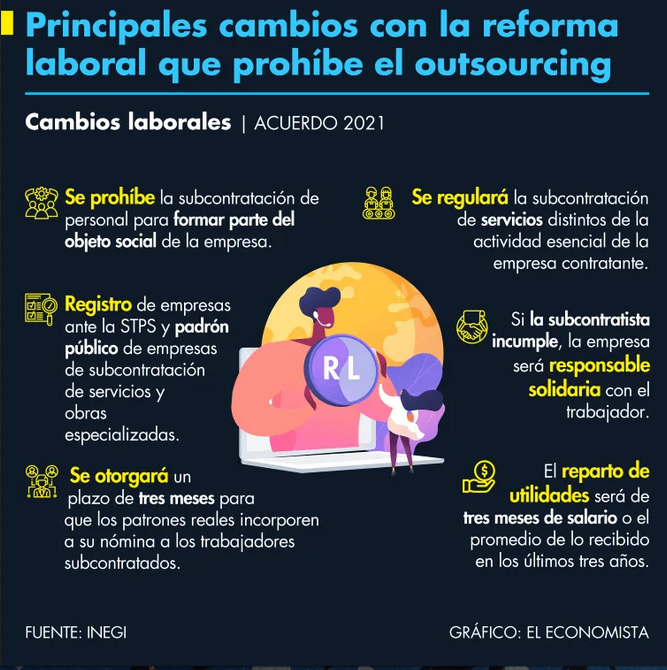Note published on April 7 in El Economista, Empresas [Companies] Section by María del Pilar Martínez.
Read original source
Interviewed separately, representatives of companies in the field of subcontracting stated that if the proposal is approved as it is, this will mean a more complex scenario for this industry.

With the possible approval of the reform on subcontracting matters, which explicitly includes, in Art. 12, that “personnel subcontracting is prohibited”, the operation of companies in this field will be delimited and they will have to move to a new business model.
Interviewed separately, representatives of companies in the field of subcontracting stated that if the proposal is approved as it is, this will mean a more complex scenario for this industry.
“With the elimination of personnel subcontracting many companies will have to move to becoming firms contracting by specialization, without knowledge on how to adjust to the bill, and even if there is a grace period. In other cases, they will close, and some companies will resort to simulation in order to continue operating without the need for opening new corporate names”, stated Armando Leñero, president of the Center of Studies on Formal Employment (CEEF).

| Key changes with the labor reform that prohibits outsourcing | ||
| Labor changes | 2021 AGREEMENT | ||
| Subcontracting of personnel to be part of the corporate purpose of the company is prohibited.
Registration of companies before the STPS [Department of Labor and Social Welfare] and the public registry of companies subcontracting specialized services and works. A term of three months will be granted for the true employers to incorporate subcontracted workers into their payroll. |
Subcontracting of services different from the essential activity of the contracting company will be regulated.
If the subcontractor fails to comply, the company will be jointly liable toward the worker. Profit sharing will be of three months of salary or the average of the amount received in the last three years. |
|
| SOURCE: INEGI [National Institute of Statistics and Geography] | ILLUSTRATION: EL ECONOMISTA | |
In this regard, Héctor Márquez Pitol, president of the Association of Human Capital Companies (AMECH) – which represents the large subcontracting companies in the country – stated that there is a high risk that not all workers under the subcontracting scheme will be hired directly by the company, “in the analyses that we have conducted, 60% of employers would hire under schemes without social security, such as by fees, assimilated to salaries, copyrights, even paying them through unions and cooperatives, which does not eliminate the bad contracting practices that affect the rights of the workers.”
According to an analysis conducted by the AMECH, only 1 million 380,000 employees could be hired as a base by companies, while 2 million 760,000 more would go to schemes without social security and 460,000 jobs would be lost outright, if the reform is approved as it is now.
This based on the 4 million 600,000 subcontracted jobs that exist in the country, according to data provided by the Inegi [National Institute of Statistics and Geography], “companies’ intentions for direct hiring would be for only 30% of the workers; 60% would go to schemes without social security and 10% would lose their jobs or would go to evasion or informal schemes.”

| Outsourcing in Mexico: 3 pieces of information on labor subcontracting | |
|
4.6 million workers are calculated to be related with some mode of labor subcontracting. |
200,000 jobs are added each year to the numbers of workers under some mode of subcontracting recorded in registries. |
|
20,000 million pesos is what the federal government calculates as the amount of taxes evaded due to bad practices in labor subcontracting. SOURCE: STPS ILLUSTRATION: EL ECONOMISTA |
|
Meanwhile, Óscar de la Vega, a specialist at the D&M Abogados Firm, explained that “this is complicated for companies whose main activity is personnel contracting; in this case, they will have to modify their service. What they currently do is placing their personnel under the name of a third party, that was the business, and they charged a percentage of the salaries they received; with the reform, however, this cannot continue to exist.”
With this solution proposed by the Executive Power, he explained, “it puts an end to two structures, insourcing within corporations, that is service providers for corporations and, in the second place, the topic of subcontracting companies.”
They can only be recruitment agencies
Likewise, Germán de la Garza de Vecchi, lead partner of Labor Services at Deloitte México, explained that the proposed reform greatly limits the roles of companies that work in third party contracting, thus, in the future, they might turn into just employment agencies or intermediaries for the process of hiring, selection and training of human capital.
Márquez Pitol said that the Agreement “limits the field of operation of companies that are currently part of the formal industry of personnel subcontracting”, and, therefore, he urged legislators to consider the incorporation of temporary work.
The AMECH agreed to “continue working and we insist that the proposal needs to be complemented with the mode of temporary employment, in order to be truly effective in the consideration of respecting workers’ rights and the search for competitiveness of the country’s productive organizations”, added Márquez Pitol.






